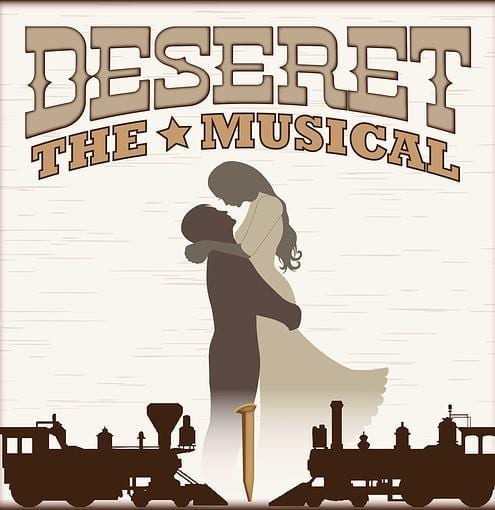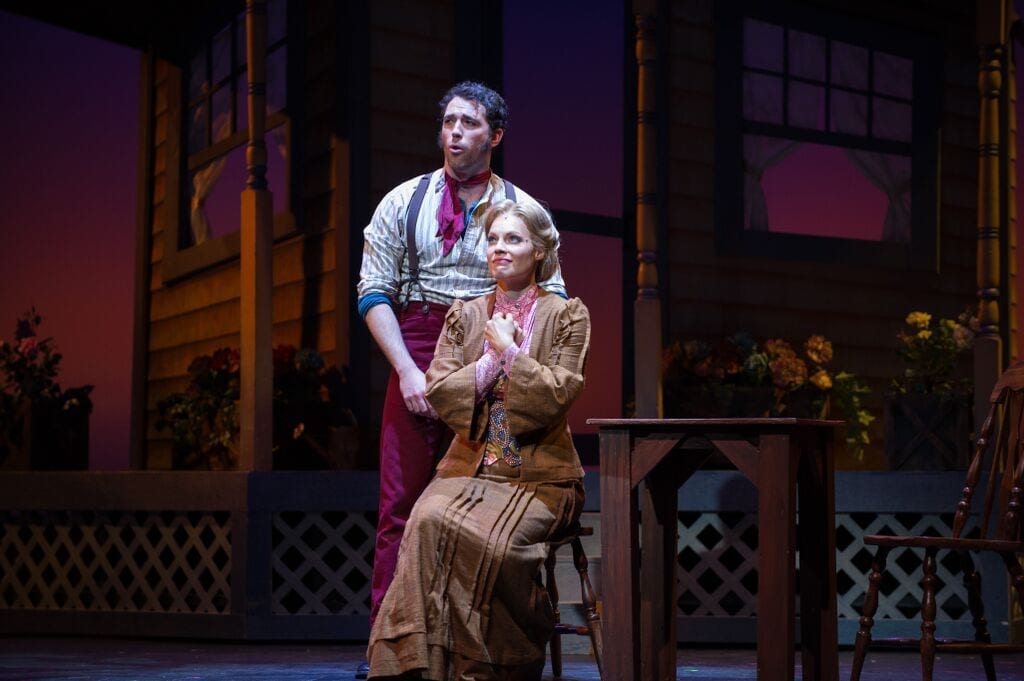PROVO — Deseret – The Musical might be the play that has the most distinctively Utahn identity of any play I have reviewed for UTBA. Billed as a love story, Deseret takes place in 1869 after the Transcontinental Railroad was finished at Promontory Point, Utah—a pivotal event in the state and the nation’s history. For America, it marked the end of the horse-and-wagon era of crossing the continent; for Utah it marked the end of a geographic and cultural isolation. For Utahns, the railroad brought opportunities and challenges that made them both nervous and excited for the future.
Deseret explores these issues through a love story that takes place in an unnamed Utah Territory town on the railroad line. One day on the train the Adams family arrives: Tully (E. Scott Wells), Martha (Alison Moore Smith), and their adult son Daniel (James Bounous). The Adams settled the town in the late 1840’s with other families, all of whom were under orders from Brigham Young to settle the little mountain valley. A few years later the Adamses left for California during the Gold Rush and became wealthy merchants. At a town social activity Daniel falls in love with Allyson (Summerisa Bell Stevens), even though she is practically engaged (but not quite) to Jacob (Spencer Stevens), a young local farmer. Additionally, a unkept non-Mormon named Niner (Peter Layland) arrives in town and after hearing about talk of a profit (actually, “the prophet”), decides to stay and try to strike it rich.
Under Kymberly Mellen‘s direction, the little Deseret town becomes a pleasant background for the main story’s love triangle. Mellen used the opening songs of “The Golden Spike” and “Welcome Back” to communicate a great deal of information about the town: its leaders, its family orientation and its orderly way of life. I also thought that Mellen carefully established the personalities of Allyson, Daniel, and Jacob in the opening scenes, which made the main conflict of the story easy to follow. This was especially apparent in “Could It Be That This is Love?” which Mellen ensured was not stagnant as a “stand and deliver” song, but rather was filled with blocking and stage business that seemed to grow naturally out of Allyson’s personality. On the other hand, there were some scenes (like the town social or the scene right before the final wood pile scene) where I was uncertain of where to look, and it was not clear to me until after the play that the social hall scene took place indoors. But these were minor details in an otherwise excellently directed show.
Summerisa Bell Stevens, James Bounous, and Spencer Stevens dominate Deseret, both in terms of stage time and in the strength of their performances. Smith infused Allyson with both a vivacious restlessness and a love of her home that made the character’s conflicts and choices (such as in the first field scene) seem real. Smith also has excellent chemistry with both Wells and Bounous, especially in the porch scene (with Bounous) and towards the end of the second act (with Spence Stevens). Summerisa Bell Stevens also has a pleasing voice that made songs like “Could It Be That This Is Love?” and “Two of a Kind” sound like they belong in the musical theatre canon. Bounous was charming as the well dressed, rich stranger in town, and his mystique (aided by the dark period suit he wore from costume designer La Beene) made it clear why the young women of the town were interested in him. Bounous also distinguished himself from the other performers in his reaction to “These Old Mountains,” which set up Daniel for some nice character development later in the play. Spencer Stevens, though, effectively created a character in Jacob who was as part of Utah as the mountains were. Jacob’s “awe shucks” demeanor was a welcomed contrast to the sophisticated Daniel, and made Allyson’s choice even more stark.
Although—like any play—many people contributed to this production of Deseret – The Musical, the show is the brain child of Carl Bell, who wrote the script, music, and lyrics. Bell’s strongest script moments are in the first act when Allyson is interacting with Daniel or Jacob. The porch scene between Allyson and Daniel, for example, was a tender scene that struck the right balance between romantic love and the trepidation that the characters felt knowing that Allyson was almost engaged to Jacob. Similarly, Jacob’s field scene when he confronts Allyson is powerful and works well with the ensuing song. The score that Bell has created for Deseret owes much to the golden age of musicals in the 1940’s and 1950’s. Bell’s debt to the era is especially notable because of the many corralaries Deseret has with the works of Rodgers and Hammerstein—especially Oklahoma!. Indeed, much of Deseret feels like a Western homage to Oklahoma! Both plays take place in a territory, there are two pairs of romantic couples, and even songs like “This is the Place” and “Could It Be That This Is Love?” seem to vaguely echo famous pieces from the Rodgers and Hammerstein work. Likewise, aspects of the script seem to harken to Oklahoma!, including a town social, a grubby outcast (although Niner is considerably more likeable than Judd Fry), and a woman having to choose between two men.
The number of parallels to Oklahoma! and other classic musicals (for example, The Music Man and Hello, Dolly! came to my mind during “The Train Is a Comin'” and Hilda’s dialogue, respectively) are considerable; once I accepted Deseret for what it was, it didn’t bother me. In a way, the familiar structure and plot elements became almost comforting. What was more troublesome was the second act script, which was a mess. The opening scene was confusing, and the closing scene felt out of place compared to the rest of the (mostly non-religious) tone of the play. Moreover, in the second act Daniel makes very few appearances, even though Allyson is agonizing over her decision to leave with him for San Francisco and many characters talk about him almost nonstop. I wish, for example, that there had been a physical confrontation between Jacob and Daniel, which could have shown them as flawed men that Allyson should rightly hesitate about. I also think that Niner’s subplot is fun, but unfocused; instead he should have been dealing with either the children or Hilda (Shandra Harper), not both. (If I had to choose one, then the interactions with Hilda were much funnier.) Act two also has the two most unnecessary songs in the play, “Deseret” and “T-R-O-U-B-L-E.” In general, I found the second act script a letdown because the first act was well written enough that at intermission I was genuinely wondering which man Allyson would choose.
Finally, Deseret – The Musical lacks what every great Rodgers and Hammerstein show had: a message. The interesting characters and the growth that they experience is fertile ground for crafting a message for Deseret‘s audience to take home. Not taking advantage of that is supremely disappointing. However, Bell should take heart. In the last world premiere musical that I reviewed, I said that the score needed a heavy revision. The task of revising a script is much easier than revising a score (with its goregous harmonies that suprass anything in the Rodgers and Hammerstein catalog), and I think that with help from one of Utah’s many playwrights Deseret could become a production at local arts councils, LDS stakes, and maybe even at historical sites.
Despite my critical reservations about the play, though, I must admit that I enjoyed meeting Allyson, Jacob, Daniel, and the other characters in Deseret. Like many potential audience members, my family history runs through territorial Utah, so seeing a musicalized, idealized version of my past is a treat. Deseret -The Musical is not as polished as the Golden Spike that completed the Transcontinental Railroad. But it has charm, talented leads, and a worthwhile first act. The play takes place in a vital time in our state’s history and serves as an interesting vehicle to explore how some Mormons today understand their relationship with the outside world and each other. If audience members can accept that much of what they will see is completely new, then they should enjoy it.







